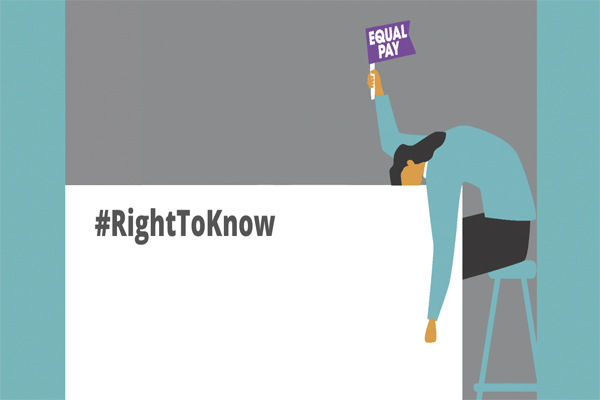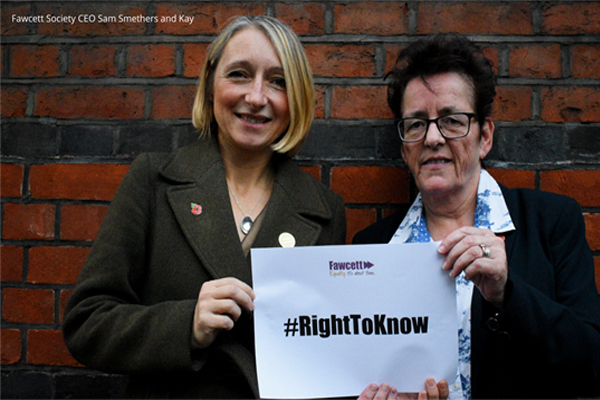According to the Fawcett Society, only 31% of working women in the UK believe that their employer would tell them if their male colleagues earned more for the same work, if they asked.
The other 69% of women either disagreed or were unsure, meaning that they would have to rely on male colleagues to reveal their pay or go through a lengthy court case to find out if they are experiencing pay discrimination. Even fewer – 23% of working women, aged over 55, said their bosses would be straight with them.
The poll from Savanta ComRes shows that the British public supports a new reform that would give women the Right to Know. Around 62% said that if a woman is not being paid equally for doing the same job as a man, she should be given the information about his pay that she needs to challenge the situation.
RIGHT TO KNOW
Additional findings from the Right to Know survey, reveals that:
- 69% of women and 55% of men agreed that if a woman is not being paid equally, she should be given the information about a male colleague’s pay that she needs in order to challenge the situation.
- Support increases with age: 69% of men and women age 55 and over support the Right to Know compared to 54% of men and women age 18-34.
Knowledge about colleagues’ pay is similar among men and women:
- 31% of female workers said their employer would tell them if they were paid less than a male colleague doing a same job if they asked; 29% of male workers said their employer would tell them if they earned less than a female colleague.
- Only 23% of female workers age 55 or over, compared to 37% of female workers age 18-34, said their employer would tell them if they were being discriminated against.
- There is no difference in answers between men and women who work part-time or full-time.

EQUAL PAY BILL
Stella Creasy, MP of Walthamstow, recently introduced the Equal Pay Implementation and Claims (EPIC) Bill 2020 into Parliament, co-signed by MPs from the Conservative, Labour, SNP, Lib Dem, and Green parties and drafted by the Fawcett Society. This Bill will make access to this essential information easier by giving women the legal right to request pay data relating to male colleagues, with appropriate safeguards on the information.
Equal pay for equal work was made a legal right 50 years ago in the Equal Pay Act 1970, but pay discrimination continues. A fundamental reason is that unless a woman knows what her colleagues earn, she cannot know if she is being paid equally. The Bill has cross-party support among MPs, and the Right to Know reform is also supported by 62% of Conservative voters and 71% of Labour voters. Support is equally high across England and the devolved nations, and across social classes.
According to Creasy, “Barbara Castle’s legendary equal pay legislation was passed before I was even born, yet still women in this country don’t get paid the same as men for their work. The gender pay gap in 2019 stood at 17.3%, which means that on average, women were paid approximately 83p for every £1 men were paid. Millions of women are on low pay because of injustice, not their inability to do the same as their male counterparts.”
PAY DISCRIMINATION
“Many women don’t even know they are subject to pay discrimination, leaving them unable to get redress without having to turn to legal action. Introducing the ‘Right to Know’ will mean that women can have the evidence they need to challenge employers if they believe a man doing the same work is getting paid more, without being forced to go to a tribunal,” added Creasy. “Together with strengthened requirements for gender pay gap reporting and BAME pay gap reporting, these measures will help deliver what our predecessors demanded – fair pay for a fair day’s work for all. I don’t want my daughter’s generation to still have to fight this battle. The time has come to make equal pay a reality once and for all.”
Commenting on the Bill, Sam Smethers, Fawcett Society Chief Executive, stated: “Women have had the right to equal pay for half a century – but equal to what? Without the Right to Know, the vast majority of women just can’t say for sure whether they are being discriminated against. “Coronavirus is turning the clock back on gender equality. This relatively simple change is essential to enable women to access their basic right to equal pay and build a more equal future.”

A FAIRER SYSTEM
In 2019 the Government committed to “review the enforcement of equal pay legislation to ensure it is working as effectively as possible”. The new EPIC Bill sets out what is required to achieve that ambition. In addition to the Right to Know, it also includes changes to:
- Make the system fairer by ending unfairly strict time limits.
- Give women back pension rights lost because of pay discrimination and damages for the emotional harm suffered.
- Ensure that rules which stop employers from denying women equal pay rights via complex ownership structures continue to exist after Brexit.
The Bill also improves gender pay gap reporting by reducing the threshold to employers with 100 staff, introducing mandatory action plans, and including ethnicity pay gap reporting. The Fawcett Society drafted the Bill with a panel of legal and HR experts, chaired by Daphne Romney QC.
It is supported by Kay Collins, a former chef for a lead UK catering firm who discovered she was being paid £6k less than a male colleague for the same work. Kay won her equal pay case and started a petition, which now has over 55,000 signatories, asking people across the country to back her and support a change in the law so companies can no longer hide discrimination.
To support the EPIC Bill, The Fawcett Society is calling on people to take two steps to be part of their campaign to fight for the #RightToKnow:
- Write to your MP and ask them to support EPIC Bill by filling out the form at: https://fawcettsociety.eaction.org.uk/righttoknow
- Sign and share the petition started by chef Kay Collins, calling for the law to change so equal pay can be a reality for more women. The petition is at: https://www.change.org/p/incoming-prime-minister-stop-pay-discrimination-give-women-the-righttoknow
Today is Equal Pay Day in the UK. Click here for more on the impact of Covid-19 on the UK’s gender pay gap.







































